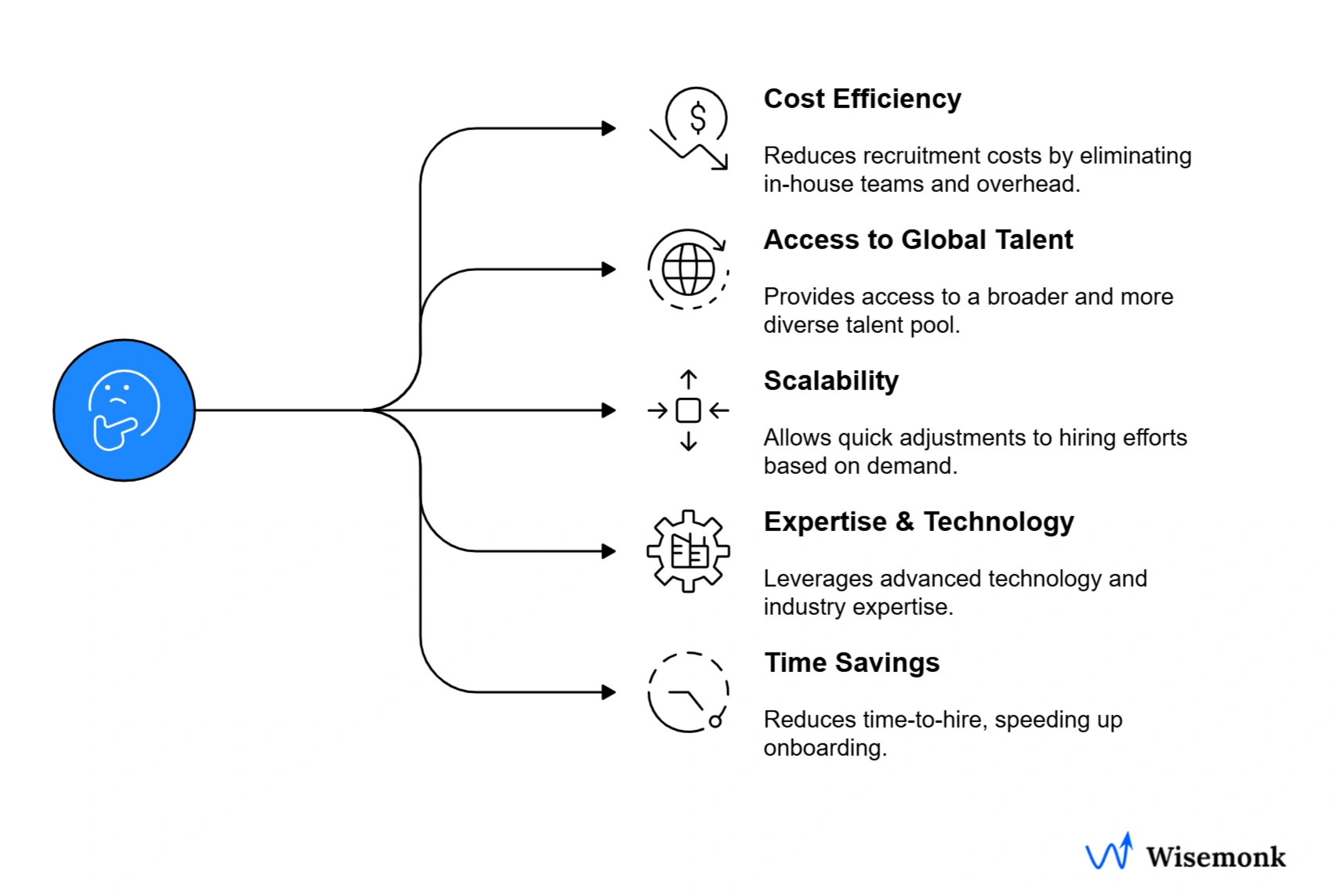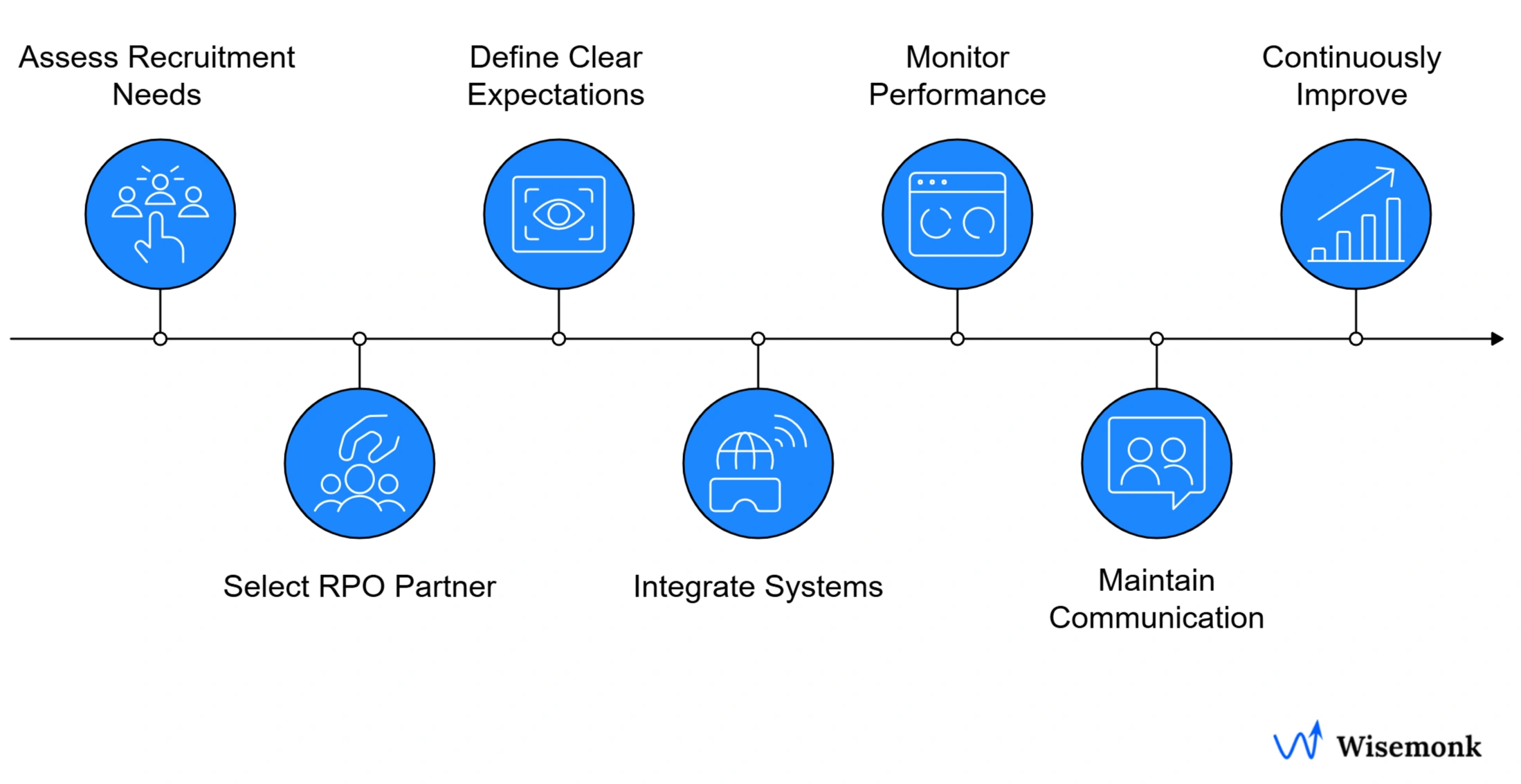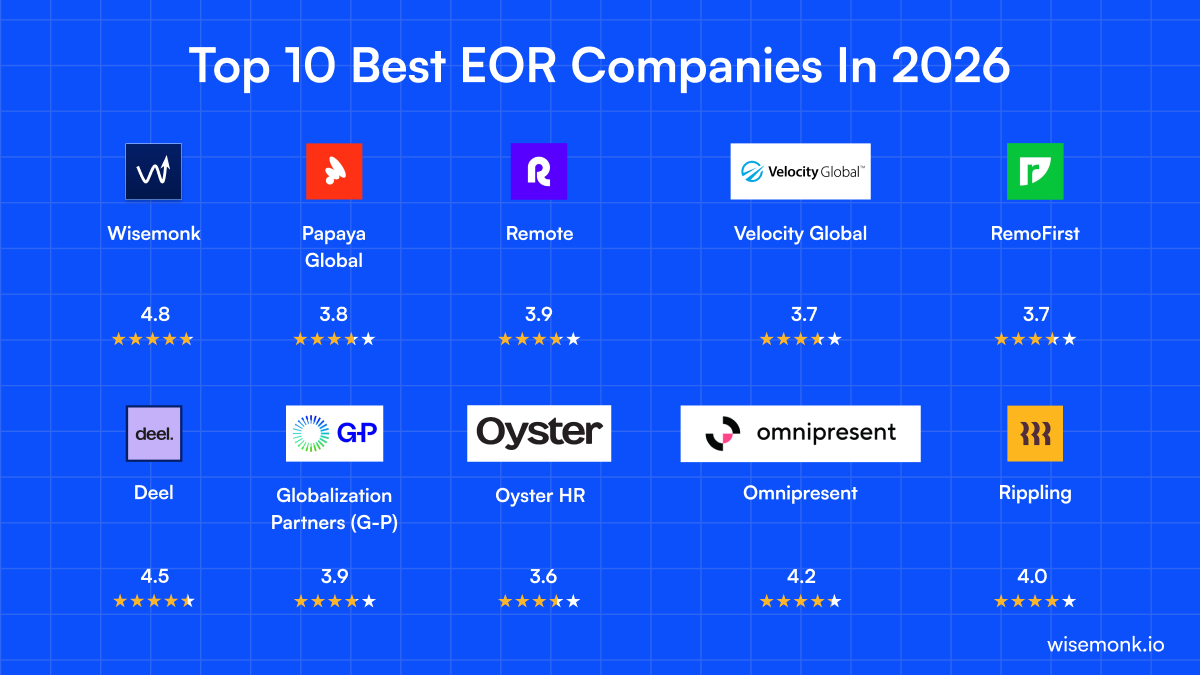- Outsourcing recruiting involves delegating recruitment functions to external providers (RPO partners) for tasks like sourcing, screening, and onboarding candidates.
- Outsourced recruiting services include full-cycle recruitment, candidate sourcing, screening, project-based hiring, and on-demand support during peak hiring periods.
- Businesses outsource recruiting to reduce costs, access global talent, scale operations, and speed up the hiring process with expert support.
- Benefits of outsourcing recruiting include cost savings, faster time-to-hire, access to a larger talent pool, improved candidate quality, and scalable hiring solutions.
- Steps to implement outsourcing recruiting include assessing hiring needs, selecting the right RPO partner, setting clear expectations, integrating systems, and monitoring performance.
Need help with your global expansion? Contact our team!
Discover how Wisemonk creates impactful and reliable content.
Looking to optimize your hiring process through outsourcing recruiting? Outsourcing recruiting can streamline your efforts, provide access to specialized expertise, and help scale your business more efficiently. The global RPO market is expected to reach $24.32 billion by 2030, growing at a CAGR of 16.1%, with companies seeing a 96% improvement in hiring performance and a 58% reduction in time-to-hire. This guide is for HR leaders, hiring managers, and business owners looking to elevate their recruitment strategies. Here, you’ll discover the benefits, common challenges, and actionable steps for successfully implementing outsourcing recruiting in your organization.
What is outsourcing recruiting?[toc=What is Outsourcing Recruiting]
Outsourcing recruiting is the practice of transferring all or part of your recruitment process to an external provider, known as a Recruitment Process Outsourcing (RPO) partner. This approach allows businesses to leverage specialized expertise, advanced technology, and scalable solutions to meet their hiring needs efficiently.
What it includes:
- Full-Cycle RPO: The external provider manages the entire recruitment process, from strategy development to onboarding.
- Partial RPO: Specific recruitment functions, such as candidate sourcing or screening, are outsourced.
- Project-Based RPO: Engaging external partners for short-term, high-volume hiring needs.
- On-Demand RPO: Flexible recruitment support during peak hiring periods or special projects.
- Function-Based RPO: Outsourcing particular recruitment tasks like job posting or interview coordination.
In our experience as a leading Employer of Record service provider, outsourcing recruiting not only optimizes your hiring process but also improves the quality of your candidates. Now that we’ve defined what outsourcing recruiting is, let’s take a deeper dive into the benefits it brings to your organization.
What options do you have to hire globally?[toc=Global Hiring Options]
When expanding globally, businesses typically choose between two primary approaches: setting up their own entity or leveraging outsourcing models.
Here’s a clear breakdown to guide your decision:

Build Your Own Entity
- Set Up a Local Entity
- Control: Full autonomy over HR, payroll, compliance, and recruitment.
- Setup: Register a subsidiary or branch in the target country.
- Best For: Businesses seeking long-term control with internal talent acquisition and scalable growth through in-house recruiters.
- Employer of Record (EOR)
- Control: You direct day-to-day operations while the EOR handles compliance, payroll, and tax filings.
- Setup: No need for a local entity. The EOR is the legal employer for your team.
- Best For: Global talent acquisition, quick market entry, and cost-effective recruitment without the complexities of entity setup.
Outsource Work
- Staff Augmentation
- Control: You manage the team's daily tasks while the provider handles recruitment, compliance, and benefits.
- Best For: Seasonal hiring, niche skills, or high-volume hiring where you need flexible staffing solutions and fast access to quality candidates.
- Managed Services
- Control: Minimal direct control; the provider takes responsibility for project delivery and performance.
- Best For: Outsourcing entire functions like IT, customer service, or recruitment for efficiency and scalability.
Whether you want to set up your own entity or leverage staff augmentation and outsourcing, Wisemonk offers end-to-end support for each option, helping you scale globally while maintaining compliance and control. Ready to explore the best option for your expansion? Contact us today!
What are the benefits of outsourcing recruiting?[toc=Benefits]
The benefits of outsourcing recruiting include cost savings, access to a global talent pool, scalability, specialized expertise, and faster time-to-hire. By partnering with the right RPO providers, businesses can streamline their hiring process, reduce expenses, and gain a competitive edge in talent acquisition.
Here are the key benefits of outsourcing recruiting:

- Cost Efficiency: Reduces recruitment costs by eliminating the need for in-house recruitment teams and their associated overhead.
- Access to Global Talent: Provides access to a broader and more diverse talent pool from different geographies, improving hiring quality.
- Scalability: Allows businesses to adjust hiring efforts quickly based on fluctuating demand, ensuring flexibility.
- Expertise & Technology: Leverages advanced recruitment technology and industry expertise to improve candidate quality and streamline processes.
- Time Savings: Reduces time-to-hire, allowing businesses to onboard new employees faster and minimize vacancies.
Outsourcing recruiting streamlines the entire hiring process, making it faster, more cost-effective, and better aligned with your company’s talent acquisition strategy.
What are the challenges of outsourcing recruiting?[toc=Challenges]
The main challenges of outsourcing recruiting include maintaining consistent quality, ensuring cultural alignment, and protecting data integrity. Based on our experience working with global hiring teams, these challenges are manageable when addressed with clear processes, communication, and accountability.
- Loss of Quality Control: It can be difficult to ensure consistent candidate quality when external recruiters manage the hiring process.
Mitigation: Define clear hiring standards, use shared applicant tracking systems, and review candidate pipelines regularly. - Cultural Misalignment: RPO partners may not fully understand your company’s values or work culture.
Mitigation: Involve internal hiring managers early, provide cultural training for recruiters, and align on employer branding. - Communication Barriers: Miscommunication between your internal HR team and the RPO provider can slow decision-making.
Mitigation: Schedule regular check-ins, use collaborative tools, and assign a dedicated point of contact on both sides. - Data Security & Compliance Risks: Sharing candidate information externally increases the risk of data breaches or non-compliance.
Mitigation: Partner with providers that follow global data protection standards (like GDPR), and use encrypted, secure platforms.
By proactively managing these challenges, businesses can ensure their outsourcing recruiting strategy remains efficient, compliant, and aligned with long-term talent acquisition goals.
What should you consider when choosing an RPO partner?[toc=Considerations]
You should evaluate how well a potential RPO partner aligns with your hiring goals, internal capabilities, and long-term talent acquisition strategy. Based on our experience guiding global companies through outsourcing recruiting, selecting the right RPO services partner determines whether your investment in outsourcing recruitment delivers measurable business value.
Key considerations when evaluating RPO providers include:
- Define your goals: Clarify your hiring needs, recruitment costs targets, timelines, and the specific roles you need to fill.
- Assess internal capabilities: Determine whether your internal talent acquisition team can handle your hiring efforts or if you need external RPO solutions.
- Align on culture: Ensure the RPO company understands your employer brand, business objectives, and internal teams’ dynamics.
- Evaluate performance metrics: Ask for clear KPIs such as reduced time-to-fill, improved quality candidates, and cost savings.
- Communicate effectively: Establish transparent channels for regular updates, progress reporting, and joint continuous improvement.
By rigorously applying these criteria, you’ll be better positioned to choose the right RPO partner, and move smoothly into implementing outsourcing recruiting with confidence.
Why is India a prime outsourcing destination?[toc=India For Outsourcing]
India is a top choice for outsourcing recruiting due to its skilled workforce, cost advantages, and strong technological infrastructure. Companies can leverage India's vast talent pool, especially in IT, engineering, and customer service, to meet diverse hiring needs.
- India offers competitive labor costs, making it an affordable option for businesses looking to reduce recruitment expenses.
- The country has a robust technological infrastructure, with advanced tools and platforms that streamline recruitment processes.
- India’s familiarity with Western business practices ensures smooth communication and collaboration between teams.
- Many global companies have successfully outsourced recruiting to India, benefiting from its efficiency and expertise.
With these advantages, India continues to be a key destination for businesses seeking reliable and cost-effective recruitment solutions.
How to implement recruitment process outsourcing (RPO) effectively?[toc=Implementation Steps]
Implementing Recruitment Process Outsourcing (RPO) involves a structured approach to ensure alignment with your hiring goals and business objectives. Here's a step-by-step guide to effectively implement outsourcing recruiting:

1. Assess Your Recruitment Needs
Evaluate your organization's hiring requirements, including volume, skill sets, and timelines, to determine the scope of outsourcing needed.
2. Select the Right RPO Partner
Choose an outsourcing provider with expertise in your industry and a proven track record of success.
3. Define Clear Expectations
Establish specific outcomes, such as reduced time-to-hire, improved candidate quality, or cost savings, to guide the RPO partnership.
4. Integrate Systems and Processes
Ensure seamless integration between your internal systems and the RPO provider's technology to streamline workflows.
5. Monitor and Evaluate Performance
Regularly assess the RPO provider's performance using key performance indicators (KPIs) like candidate quality, time-to-fill, and hiring efficiency.
6. Maintain Open Communication
Establish transparent communication channels to facilitate collaboration and address any issues promptly.
7. Continuously Improve the Process
Gather feedback and make necessary adjustments to optimize the outsourcing recruiting strategy over time.
By following these steps, you can effectively implement outsourcing recruiting to enhance your talent acquisition strategy.
What is the future of outsourcing recruiting?[toc=Future Trends]
The future of outsourcing recruiting is being defined by advanced technology, remote work models, and a stronger focus on ethics and sustainability. RPO providers are evolving from service vendors to strategic partners that help companies make smarter, data-driven hiring decisions.
- AI and automation are transforming recruitment by automating resume screening, sourcing candidates, and predicting job-fit using data analytics.
- Remote work has expanded access to global talent, enabling companies to hire qualified candidates across borders while leveraging virtual tools for interviews and onboarding.
- Skills-based hiring is replacing degree-based evaluation, allowing RPO providers to focus on proven capabilities and pre-employment assessments.
- Enhanced candidate experience is now a priority, with RPO experts using AI to personalize outreach, improve communication, and strengthen employer branding.
- Ethical and sustainable practices are gaining traction, as companies demand transparent, bias-free AI tools and eco-conscious recruitment processes.
In short, outsourcing recruiting is moving toward a tech-enabled, skills-driven, and values-focused model, one where RPO experts act as long-term partners helping businesses hire smarter, faster, and more responsibly.
How Wisemonk helps global businesses simplify hiring?[toc=How Wisemonk Helps]
Wisemonk is a trusted partner that helps businesses expand globally by offering comprehensive solutions tailored to your needs. Whether you're establishing your own entity, leveraging Employer of Record (EOR) services, or opting for staffing and outsourcing models, we provide end-to-end support to simplify your expansion process.
- Establish Your Own Entity: We assist in setting up a legal entity, ensuring compliance with local regulations, and managing HR, payroll, and benefits, giving you full control over your operations.
To know more about the difference between an EOR and setting up your own entity, refer to our article on Employer of Record vs Own Entity: What to Choose in 2025. - Employer of Record (EOR)Services: For rapid market entry without the complexities of setting up an entity, we act as the legal employer, handling all employment-related responsibilities, allowing you to focus on your core business.
- Staffing & Augmentation: We provide skilled professionals to augment your team on a temporary or long-term basis, offering flexibility and access to specialized expertise.
- Outsourcing Solutions: We manage entire functions or projects, ensuring efficiency and cost-effectiveness, so you can concentrate on strategic growth.
To learn more about the difference between Staff Augmentation and outsourcing, refer to our article on Staff Augmentation vs Outsourcing: Differences & Best Fit
With Wisemonk, you get a single partner for Employer of Record, staffing, and managed outsourcing, designed to make hiring globally simple, compliant, and scalable. Contact our team today!
Frequently asked questions
What is outsourcing recruiting?
Outsourcing recruiting means delegating your company’s recruiting process to external recruiting companies or RPO providers. These expert recruiters handle sourcing, screening, and onboarding, allowing hiring managers to focus on strategy. It’s a business process outsourcing model that helps find qualified candidates faster and more efficiently.
How can outsourcing recruiting benefit my business?
Outsourcing recruiting can reduce recruitment costs, improve candidate quality, and accelerate your hiring process. RPO services bring expert recruiters, data-driven insights, and scalable workforce solutions that support business growth while optimizing the entire recruitment process.
What should I look for in an outsourcing partner?
Choose an RPO partner with proven industry expertise, advanced applicant tracking systems, and transparent reporting. Look for partners that understand your company culture, provide continuous improvement through data-driven decisions, and align recruitment strategies with your hiring goals.
Is India a good destination for outsourcing recruiting?
Yes. India offers a vast pool of skilled talent, cost efficiency, and strong English proficiency. Recruitment companies in India use advanced hiring technologies and provide flexible RPO solutions, making it an ideal destination for global businesses seeking quality candidates.
What are the pros and cons of outsourcing recruitment?
The pros include reduced hiring costs, faster time-to-hire, and access to specialized talent acquisition teams. The cons can include less control over the hiring process and the need for strong communication to maintain candidate quality and alignment with company culture.
Is outsourcing part of HR?
Yes. Outsourcing recruiting is a component of HR outsourcing, allowing companies to delegate hiring functions while focusing internal teams on employee engagement, retention, and HR strategy. It supports a more efficient and effective talent acquisition process.
What skills are needed for RPO?
RPO experts need strong sourcing and assessment skills, data analytics proficiency, and deep knowledge of applicant tracking systems. They also require communication, stakeholder management, and compliance expertise to deliver a smooth and effective hiring process.
.webp)
.png)
%20(1).webp)
